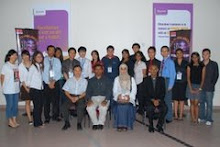(Taken from "Deepening our discipleship, NEWBEC, 22nd July 2007)
For many, the Bible is a difficult book. How do we interprete it? How would we know that our interpretation is correct? Recently, the furore over the book and film "The Da Vinci Code" may have raised questions in the minds of many, Christians as well as others, about the historicity of the Bible.
...we must 'carefully search out the meaning which the sacred writers really had in mind'. In order to do this, we must pay attention to the literary forms in which the Bible is written. We  must try to see how people might have thought, spoken, and expressed themselves at the time of the bible writers. We need to be aware that there are different types of literature in the Bible such as narrative, poetry, proverbs, parables, laws, history, myth, legend etc. Therefore, we cannot take everything literally. We must also consider the context a text occurs.
must try to see how people might have thought, spoken, and expressed themselves at the time of the bible writers. We need to be aware that there are different types of literature in the Bible such as narrative, poetry, proverbs, parables, laws, history, myth, legend etc. Therefore, we cannot take everything literally. We must also consider the context a text occurs.
We also need to be aware that the teaching office of the Church. The bishops, who are the successors of the Apostles, have an important role in helping us to come to a definitive interpretation of the Word. It is always important to see how the church has through the ages interpreted a particular text.
Perhaps, for the beginner, a guide to reading the daily liturgical readings such as Shalom or The Word Among Us might help us to see the texts in line with the understanding of the Church. Commentaries and also certain Internet resources may also be of great help.
Here are some things to consider when reading the Bible :
1. What does this text tell me about God?
2. What does this text tell me about the people of God?
3. What does this text tell me about myself?
In conclusion, getting back to The Da Vinci Code, many were upset at the film and book. Yet perhaps we can view it positively in that we have been challenged to take up our bibles again and work out what it is that we truly believe in. It has made us think and evaluate and hopefully, strengthened our faith as we also discussed with others, non- Christians included. So perhaps it may be seen as a blessing in disguise!
Saturday, July 21, 2007
Interpreting The Bible
Posted by CSS of UCSI Malaysia at Saturday, July 21, 2007
Subscribe to:
Post Comments (Atom)


0 comments:
Post a Comment